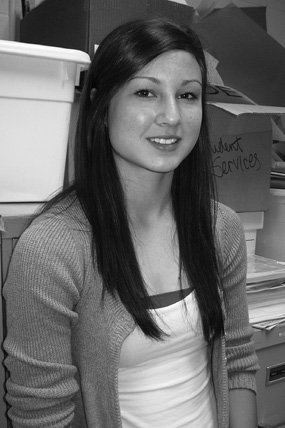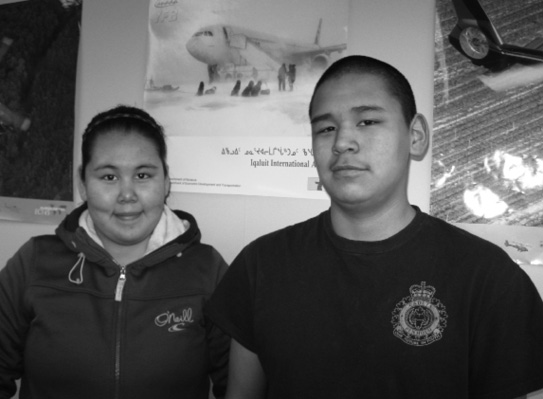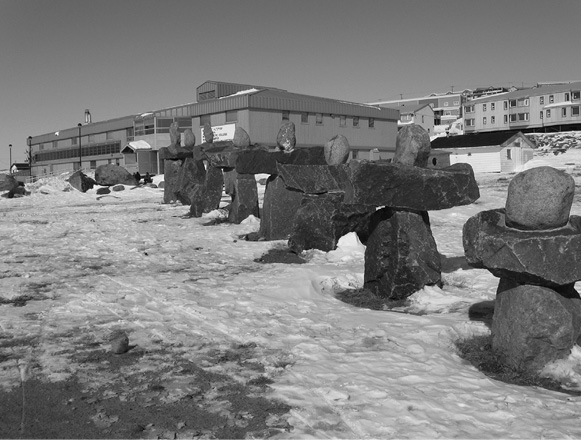Looks Like Daylight (15 page)
Read Looks Like Daylight Online
Authors: Deborah Ellis

Brittany, 17

The use of Indigenous names and caricatures in sports teams is an on-going issue. Some sports fans are adamant about their right to do the “tomahawk chop” and wear feathered headdresses to games. When Native Americans protested the name Cleveland Indians and the baseball team's logo, Chief Wahoo, they were met by folks who spat on them and pelted them with beer cans.
The Washington Redskins football team has been sued to get it to change its name. “Redskin” was first used to refer to the bloodied scalps of Native Americans taken by white men to be exchanged for bounty payment. The 1755 Phips Proclamation gave permission to the settlers to kill all the Penobscot Indians. It laid out how much money the government would pay for each dead Indian
â
fifty pounds sterling for adult male scalps, twenty pounds for each child.
People are becoming aware of how insulting these names and caricatures are to Indigenous people, and are starting to change things. Boards of education in Oregon, Wisconsin, Maine and other states have voted to ban Native American mascots in state schools.
Brittany is a young athlete from Ontario who has received support and encouragement from her Ojibwe community.
I started running when I was in grade six. It was fun. It's easy to do. How I do in a race depends only on me, not on what the rest of the team does. It's gotten more intense as I've gotten into higher levels of competition, but it's still fun.
Running has taken me all over. Lots of in-Canada meets, of course, and I went to Italy in 2009 to the IAAF World Youth Championships in Bressanone.
My best events are the 400 meters and the 400-meter hurdles. I got eleventh overall, and third place out of the other sixteen-year-olds. That means I was the third-fastest sixteen-year-old on the planet!
There were young people there from all over the world â Kenya, Australia, everywhere. They allowed kids to compete in the way they felt most comfortable. Some ran all seven laps in their bare feet! Seven laps on hard track!
It was my first time flying. My mom and grandma joined me there a couple of days after I went. I had to go early to get over jet lag and get used to the higher altitude. Bressanone is in the mountains. It was a bit of a challenge for me. I have a touch of asthma and had to use my puffer. It rained a lot too â thunder, lightning, everything.
No one talked English in this little town except for us foreigners from English-speaking places. It was great being surrounded by so many different languages.
All the Canadians stayed at the same hotel so that we could feel more like a team.
We all had to pay our own way to Italy, and my family doesn't have a lot of spare money. So the community took it on. There was a powwow on the reserve. First the chief made a speech honoring me and the other youth of the community. Then the Blanket Dance started. People danced and threw money on the blanket, and that's how I was able to go to Italy with my family.
The community didn't just give me money. They also followed me on the internet and Facebook so I really felt backed up by everyone when I was on the other side of the world. It was like they were all over there with me.
When the Olympic torch relay came through this area, the community chose me to carry the torch through the reserve. It was so exciting! Everyone was lined up along the street, cheering and waving. I felt so tall and proud running through all that.
I haven't had to deal with too much racism, probably because my skin is fairly pale and I could pass for white. Other students from my reserve have had a lot of stupid stuff thrown at them by white kids and adults. Because some people take me for white, white people will say racist things to me about other Natives. I usually challenge it. Sometimes I don't have the energy.
Even white people who know I'm Native can sometimes act like jerks. They'll say, “Heading home to your tepee?” or go “Woo woo woo woo!” and pound their hands on their lips, doing some lame Hollywood version of a war dance.
Others ask me questions, and some of the questions are fine. You can tell when people really want to know something in order to get to know you better. But some questions go too far. Like, because I'm Ojibwe they think I was born on some sort of different spiritual plane or something. All these white people who want to be Native because “Native culture is so beautiful.” It's another way of not seeing me as human. It's another way of being racist.
A lot of First Nations kids struggle. They don't think they can make it. They don't think there is any place for them in the world. But the more of us who succeed, the more examples there will be for others.
If the white world thinks Native kids are worthless, then the best answer we can give them is to become the best â the best athletes, the best scholars, the best lawyers, the best parents â whatever. Not for them. For ourselves. To protect ourselves from all those negative messages.
Athletics has forced me to take school more seriously. I'm determined to get an athletic scholarship to university. Schools have already approached my coach about me â Florida State, Columbia University, University of Buffalo, University of Nebraska.
My ultimate goal is the Olympics, of course. After that, some sort of police work. Aboriginal communities need good police officers who know them and won't shoot them. And we can also use more women in the police.
To other kids, Aboriginal or not, I'd say, Get out there and run! Remember what it was like to be a little kid, when we just ran and ran because it was fun? You don't have to lose that feeling forever. Get out and run around and feel that joy again.
Jamie, 16

American Indians have a higher percentage of enrollment in the armed services than any other group. The first Native American recipient of the Medal of Honor (1869) was Co-Rux-Te-Chod-Ish, or Co-Tux-A-Kah-Waddle, who served with the Indian Scouts. In World War I, a law was passed requiring all Native American men to register for the draft even though they were not considered citizens and could not vote. Many thousands voluntarily joined the military. Many others protested this law. In Utah, for instance, the protests were so vehement that the army was called in to stop them.
More than 44,000 Native Americans served in World War II, where Navajo Code Talkers played a pivotal role. Ten thousand served in Korea and 42,000 in Vietnam. Ten thousand of those who have served have been women. Eighteen thousand have been sent to Iraq or Afghanistan. First Nations people in Canada have also served with great distinction.
In Canada, Aboriginal veterans were for a long time not entitled to the same benefits granted to soldiers of European descent. Native veterans were told that since they were not considered Canadian citizens (First Nations people did not obtain the right to vote until 1960), they were not eligible for veterans' benefits. And it wasn't until 1992 that Aboriginal vets were allowed to lay a wreath at the National War Memorial in Ottawa on Remembrance Day.
At powwows, veterans are treated with special respect, and a ceremonial dance is done in their honor. Jamie and his sister, Sheila (shown in the photo), live in Iqaluit.
My sister is in grade nine. Her best subjects are math and science, and mine are math and English. I'm in grade ten. For a while, it looked like we were going to live in Coral Harbour. Mom started dating a guy from there a little while back, so we went and stayed there for a bit. It's on the south shore of Southampton Island, which is in the northern part of Hudson Bay.
I liked it there. It's really small with lots of wildlife. You used to be able to see caribou all the time in Iqaluit, but not anymore. We saw polar bear in Coral Harbour and caribou and fox. There's walrus and Beluga whales. It was easy to get to know everyone. Also there are no bars in Coral Harbour, so there were no drunk people around. I liked that a lot.
But it didn't work out with Mom's boyfriend, so we came back to Iqaluit. My mother's home community is here. Our dad's in Pangnirtung but now he's living somewhere in Ontario. Ottawa, I think. He sends us letters sometimes, but I don't know his address.
My sister and I are in foster care now. Our foster mom works at a bank. If people need a loan, they go talk to her. Our foster dad is a lawyer.
Our mother is here in Iqaluit but she's not well. She has a little problem with alcohol. She gets sad from all the things that have happened to her. So it's not good for us to live with her just now.
Our grandmother was the one who told us that we should join air cadets. I've been in it for about three years, my sister for two.
In cadets we learn all about flying, about planes, about survival, about the military. We do drills, shoot rifles, although we use pellets instead of real bullets.
We shoot at targets. There are different kinds. The one I like the best is where you shoot at different colors of dots. Another is a drawing of dynamite and you shoot at where the fuse lights up.
We have shooting competitions â cadets against the parents. Two cadets and two parents go on the shooting range, and they have to see who can hit the most targets in a certain amount of time.
We go to cadet camp in the summer in Whitehorse. The first year I went, I got to fly in two small planes. The planes have two pilots and three passengers. The cadet flies the plane along with the real pilot.
The basic cadet camp is in Whitehorse. After that I went to a basic leadership camp in Penhold, Alberta. Sheila and I went to the same camps for the first years, but this year she's going to a camp that teaches basic aviation and engineering. I'll be going to a six-week leadership training.
I've done some leadership training already. It teaches you how to get to know who your students are â who is quiet, who talks a lot, who learns fast, who learns better in groups. The idea is to learn how to teach things in a way that everyone can learn it and to also have fun while they're learning. At last year's camp we had to create our own teaching materials and decide how to do it.
You can learn survival training if you go to a basic survival training camp, but there's a big difference between survival in the south and survival up here in the north. Some things are the same but not many. How to build a fire, how to get help, how to get food. They're all different up here.
Drilling was hard to learn at first because it's not a regular way of moving. You have to concentrate. And if you're looking to the person in front of you to help you and they're not in step, then you're thrown off too.
But drilling is good because it teaches you how to discipline yourself and how to stay still. Often when you sit in the regular way, you fidget, or squirm, or your attention goes. It's hard to sit still and focus yourself. Try it and see. But it gets easier with practice. Our elders know how to do it. They had to do it during hunting and fishing.
When the training gets hard, I remind myself of all the opportunities we're getting. Sheila was thinking of quitting but decided to keep on with it. Next year she can get a glider's license if she works hard. That's a good deal.
The things Sheila doesn't like are putting gel in her hair to keep it smooth when she's in her uniform. I hate polishing my boots and I have to cut my hair every week. But I like the uniform and what I'm learning, and the good is more than the not so good.

Downtown Iqaluit
We have a new officer leading us. She's tough and smart and strong. She's giving us inspections every week. The cadet who has the best uniform gets free canteen. That means they get to choose some items from the canteen. It's snacks.
Sheila and I work at the Northern store. That's the big store here that sells groceries, clothes, furniture and camping gear. Sheila stacks groceries and carries heavy stuff. I work at a cash register. It's usually the other way around, with girls working the cash and guys doing stock. I've been working there for almost two years. I'd like to get a job at the Quick Stop variety store on the road to Apex. It's a smaller shop.
Iqaluit is a really good place, lots of homes and our school is really nice. But there are problems too. There's not a lot of shops, so if you don't like the clothes in the Northern store, you're kind of out of luck. Unless you're able to go south to shop, and a flight south is really expensive. It seems like almost every parent has to give up their kids or put their kids in foster care. Lots of kids don't have money to eat every day.
My supervisor at the Northern store told me to watch out for stealers. It puts me in a funny position because I don't want to get fired but I also don't want to get people in trouble. Most of the poor people are Inuit, not white. I don't want to rat on my own people. Some of the folks I've seen steal things I know are really poor, and they steal because they're hungry. One guy stole a box of frozen pizza. Another guy stole a bag of brown sugar. I guess it's what they could grab. Food is really expensive up here, and if you don't have a good job, it's easy to go hungry.
There are a lot of Inuit up here. More Inuit than white people, so I haven't had to deal with racism up here. There were times with other cadets when I went to camps in the south. One white kid used to talk to me as though I was stupid. This was at the camp in Penhold. I wasn't the only one he treated badly. The leaders caught on to this kid and he got RTU â Returned to Unit.
In my sister's flight â an air cadet word for group â a few white kids would ask her to say words in our language, then they'd make fun of how it sounded and say disrespectful things about our family. The flight sergeants made them knock it off.
Both my sister and I want to join the military when we're older. Sheila's also thinking about becoming a commercial pilot. We're learning things in cadets that will help us get there.
